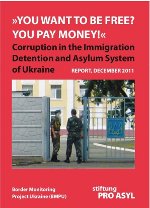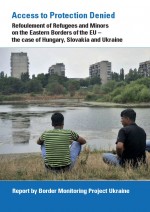In December 2012, UNHCR Ukraine published a statement concerning the newly-adopted amendments in Ukraine. UNHCR states, that these
amendments to the Law on the State Border Guard Service of Ukraine give the State Border Guard Service the power to authorize the detention of foreigners and stateless persons in the Migrant Custody Centre, if the individuals were detained in the border regions while attempting or making an illegal border crossing. Until now, such detentions have been authorized by a court, not an administrative body, and this is the better approach. According to the Ukrainian constitution, detention should be authorized by a court (Art. 29), and European human rights law reinforces this norm, which is a fundamental guarantee for individual liberty.
Furthermore, UNHCR criticizes that Ukraine failed
to introduce periodic judicial review of detention in cases where persons are in administrative detention pending deportation. In Ukraine, such detention can last up to 12 months. The European Court of Human Rights has held that in cases involving deportation, judicial review should be frequent (generally about every two months), since “factors relating to the progress of…the deportation proceedings and the authorities’ diligence in the conduct of such proceedings, may change over the course of time.”[2] In Ukraine, the absence of periodic judicial review has led to prolonged detention of asylum-seekers. For example, in 2012, UNHCR has observed that many asylum-seekers (including persons from Afghanistan, Eritrea and Somalia) have remained in detention even while their asylum applications were under substantive consideration. These asylum-seekers have filed appeals against their deportation and detention; however, practice shows that they must wait for lengthy periods – often 6-9 months – for Appeal Administrative Courts to considertheir appeals. Many asylum-seekers thus remain in detention for twelve months at the cost ofthe state, as the authorities do not even attempt to deport them for various practical or financial reasons. Then they are released because the maximum detention period has been served withno solution available to them other than to attempt to cross the border into the European Union once again .
Even before this changes of the law, in many cases the juridical review of detention of (potential) asylum-seekers was de facto not existing in Ukraine. Former detainees reported to BMPU that they were locked in a border guard car in front of the court while their court trial took place. Others reported that there was no translator present during the hearing, that they were not represented by a lawyer or that they were not allowed to speak at all. Furthermore, detainees in Zhuravychi Detention Centre had to pay for their transportation (plus guarding personal) from the detention centre to the court in Lviv (the second instance).
However, that Ukrainian legislation now breaks officially with the principle of the separation of powers and allows border guards to decide about detention of foreigners without involving courts speaks for itself. But the scandal goes much deeper: It was the European Union who was forcing and consulting Ukraine’s building up of new detention centres for (potential) transit migrants who are trying to reach European Union countries. In many cases these irregular migrants have well founded reasons for applying for asylum in the European Union countries, for example because they are citizens of civil war countries like Afghanistan or Somalia. But, following the strategy of outsourcing “migration management” to the neighbouring countries outside the Schengen-Zone, the European Union not only supported Ukrainian security forces in protecting the borders to European Union countries, the European Union even provided financial support for the construction of detention facilities. Over different programs, the European Union supported the construction and the running of different types of detention centres in which from now on (potential) asylum-seekers can be detained up to one year without any court decision. Background information and sources about the financial involvement in the detention regime in Ukraine can be found in this BMPU-article under the topic “Role of the European Union” and in the Human Rights Watch report “Buffeted in the Borderland”.
There are even efforts to build up new EU-financed detention centres in Ukraine. Already in 2011 the European Delegation in Ukraine stated in a press release:
The European Union has allocated € 30 million to enable the European Union – Ukraine Readmission Agreement to deal with illegal migrants, strengthen national migration policy, and to build seven Temporary Holding Facilities as well as two Migrant Custody Centres over the next two and a half years.
The EU ‘Consultancy to Set Up Custody Centres and Temporary Holding Facilities for Irregular Migrants’ will help Ukraine detain and adequately treat irregular migrants – in compliance with European best practices and humanitarian standards set by Council of Europe, the European Court of Human Rights, the Committee for the Prevention of Torture and Inhuman or Degrading Treatment or Punishment, as well as the EU acquis communitaire.
One of these “centres” – prison would be the right wording – will soon be opened in Martynivske (Mykolaiv region). The European Union funded the construction of this new detention centre with € 9,532,400.00 through the so called “READMIT”-programme.



